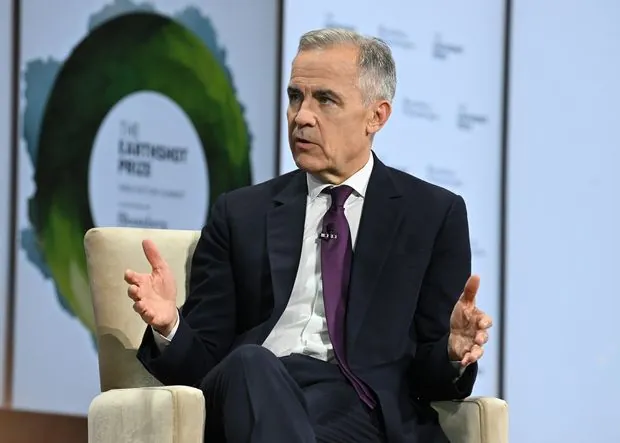
Stephen Lecce's Ambitious Vision for Ontario: The Quest to Become an Electricity Powerhouse
2024-11-10
Author: Olivia
Stephen Lecce, Ontario’s energetic Minister of Energy and Electrification, has unveiled an ambitious plan aiming to catapult the province into the ranks of global electricity powerhouses. His revolutionary approach focuses heavily on enhancing nuclear energy while ensuring affordability for all Ontarians.
“My mission is to ignite change and inspire a new level of ambition within Ontario's energy sector,” Lecce stated in a recent interview, highlighting his determination to transform the energy landscape in the province.
According to Ontario's Independent Electricity System Operator, the demand for electricity is set to surge by an astonishing 75% by 2050—essentially requiring the generation capacity equivalent to the addition of four-and-a-half cities the size of Toronto. Lecce asserts that he envisions a plan that not only meets this rising demand but also permits Ontario to export excess energy beyond its borders.
Lecce, who represents the riding of King-Vaughan, is no stranger to the political sphere. He offered guidance as Ontario's Minister of Education during tumultuous times shaped by the COVID-19 pandemic and was instrumental in mandating Holocaust education in elementary schools in Ontario. This diverse background has laid the foundation for his recent appointment as Minister of Energy, where he aims to introduce a more aggressive and responsive energy strategy in Ontario.
Critics of past administrations argue that excessive emphasis on renewable resources may jeopardize energy reliability and affordability. Lecce countered this notion: “We must prioritize low-cost options rather than adhere to ideological views. By concentrating solely on renewables, we risk creating significant reliability issues and soaring costs.”
Central to Lecce's energy strategy is nuclear power, which he believes is essential for stable base-load energy generation. Despite a history of nuclear accidents creating public apprehension, the tide appears to be turning, with nuclear energy gaining favor as a reliable and carbon-free solution. For instance, the site of the Three Mile Island incident is slated for a resurgence to meet increasing energy demands from tech giants like Microsoft.
While the province's existing energy grid is largely powered by nuclear and hydro resources, Lecce is advocating for an expansion of both sectors. Plans are underway to extend the lifespan of existing nuclear facilities at Bruce and Pickering while integrating four new small modular reactors at the Darlington site.
However, questions arise on how Ontario will efficiently distribute the impending influx of generated power. Lecce noted that local communities are primed to contribute, understanding the past challenges under previous administrations, which often led to some of the highest energy costs in North America. He emphasized the government’s commitment to ensuring local communities have a say in energy decisions and affirming the preservation of prime agricultural land.
As the low-cost electricity race intensifies—with Big Tech vying for power to fuel artificial intelligence operations—Lecce envisions bolstering Ontario's energy trade. He recently met with U.S. energy officials to discuss expanding interties that will enhance Ontario's power export capabilities to the United States. “Our top priority is to ensure Ontarians have adequate energy supply first,” he clarified. “However, the U.S. market poses a lucrative economic opportunity that we cannot overlook.”
Moreover, he assured Ontarians that, unlike former administrations that sold energy at discounted rates, his government aims for competitive pricing through long-term purchase agreements with American buyers. “Our goal is to sell energy at a premium, similar to how the U.S. has sold to us,” Lecce remarked—highlighting a newfound assertiveness in Ontario’s energy negotiation landscape.
The plan for a nuclear energy-driven future carries the potential for substantial economic growth, especially as rising energy rates have become a pressing concern worldwide. Even California, long regarded as a leader in green energy, is now recognizing the challenges of keeping electricity affordable amidst ongoing transitions.
With history, vision, and a foundational commitment towards transformative energy reform, Stephen Lecce’s initiative to position Ontario as a powerhouse in affordable, reliable nuclear energy could redefine the province’s future. Will Ontario truly rise to the occasion and become an electricity leader in North America? Only time will tell, but Lecce’s bold approach is certainly sparking conversations across the energy landscape.









 Brasil (PT)
Brasil (PT)
 Canada (EN)
Canada (EN)
 Chile (ES)
Chile (ES)
 España (ES)
España (ES)
 France (FR)
France (FR)
 Hong Kong (EN)
Hong Kong (EN)
 Italia (IT)
Italia (IT)
 日本 (JA)
日本 (JA)
 Magyarország (HU)
Magyarország (HU)
 Norge (NO)
Norge (NO)
 Polska (PL)
Polska (PL)
 Schweiz (DE)
Schweiz (DE)
 Singapore (EN)
Singapore (EN)
 Sverige (SV)
Sverige (SV)
 Suomi (FI)
Suomi (FI)
 Türkiye (TR)
Türkiye (TR)